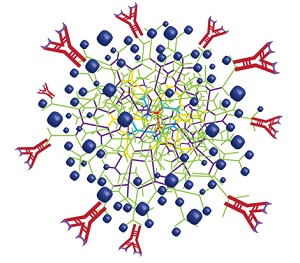 |
| Representation of 3DNA platform--Courtesy of Genisphere |
Pennsylvania nanotech company Genisphere announced this week that in preclinical studies, its 3DNA platform has successfully treated a cataract surgery complication called posterior capsular opacification (PCO).
PCO, a clouding of the eye, results from problematic Myo/Nog cells. The researchers at Genisphere used monoclonal antibodies to target the cells, depleting them with the drug doxorubicin. The company claims that its 3DNA platform delivers 100 times more of the drug to targeted cells than does a normal antibody-drug conjugate.
3DNA entirely comprises strands of DNA linked together with complementary sequences into a structured mass of genetic material. The end product can hold a drug in its scaffold of DNA as well as antibodies on its surface, giving it both vehicular and targeting capabilities.
And with preliminary success treating PCO, the researchers at Genisphere are confident that 3DNA is a viable platform for other drugs down the road. Myo/Nog cells are thought to contribute to tumor growth.
"Since the antibody has broad utility and 3DNA nanocarriers can deliver a variety of drug cargoes, we can easily generate targeted drugs for many of these indications," Genisphere Chief Scientific Officer Robert Getts said in a statement. "Genisphere's partnership model for development of nanotherapeutics has set the path forward for clinical testing and future commercialization of these and other candidates."
- here's the release